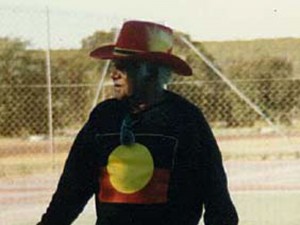Edward (Ned) Mippy
Ned Mippy was born on the 1st January 1919 and died on the 5th May 1992. Although not originally from the Moora area, the late Ned Mippy played an enormously valuable role in the Yued community. He was a widely admired and respected Elder, who devoted a large portion of his life to teaching Cultural Education programs in the Moora area, and promoting Noongar identity. Mr Mippy will always be remembered as an outstanding role model and an inspiration to the Noongar community.
